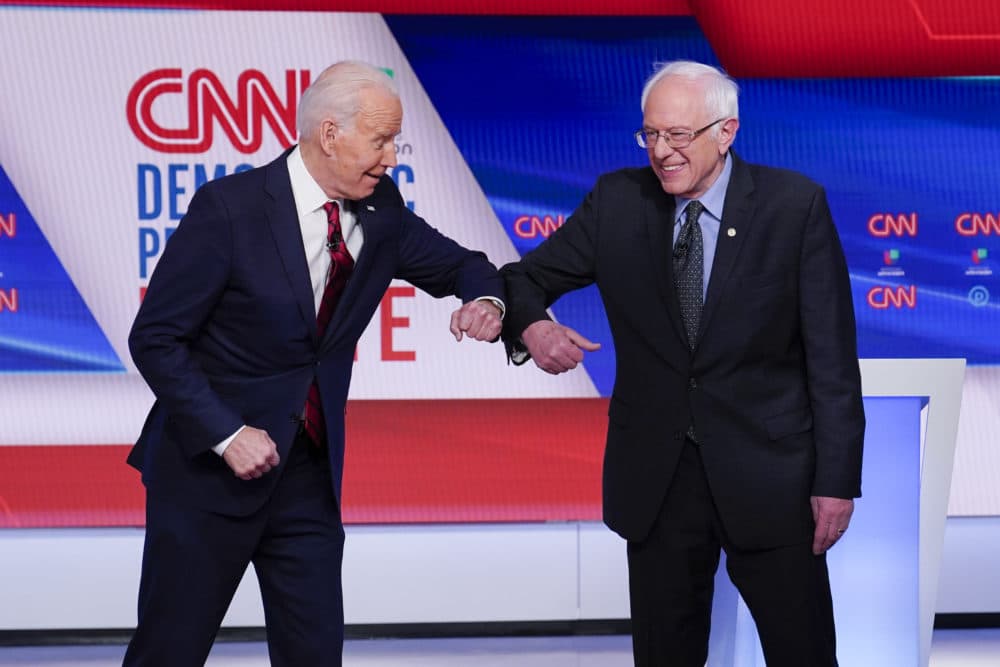Advertisement
Candidates Adapt To A Socially Separated Campaign Season

The coronavirus pandemic has brought much of the world's activity to a standstill, including political campaigns. That means races from Massachusetts to the presidential campaign are suddenly very different.
In the race for U.S. Senate, Congressman Joe Kennedy, who is hoping to replace Senator Ed Markey, suspended his campaign last week, and is now hosting virtual town halls on Facebook and YouTube.
"We've been running, as you all know, a very aggressive retail-based campaign; a lot of handshakes, a lot of fist bumps, a lot of high fives, a lot of hugs," Kennedy said on a recent town hall. "And you just can't do that right now."
Kennedy uses these virtual meet-ups to keep constituents abreast of the epidemic and how Washington is responding. The incumbent Senator, Ed Markey, is doing pretty much the same thing.
"Our campaign staff has been working remotely ... [and] I've suspended all in-person activities," Markey said during a recent teleconference with health care experts in Boston.
Instead of campaigning, Markey said he's concentrating on passing legislation to fight the coronavirus epidemic and help working Americans.
"This is the only thing I'm focused on, and I'm going to continue to do that until we ensure that we have resources for our state and our country to deal with this emergency," he said.
So for the coming weeks, if not months, the traditional campaign is gone. No rallies, no kissing babies, no knocking doors.
"All of that will have to change, and that is new territory for us," said Peter Ubertaccio, a political scientist and dean of the College of Arts and Sciences at Stonehill College.
What's not new is the investment modern political campaigns have made into a digital presence, Ubertaccio said. The good ones can ramp up their existing efforts to reach supporters online and through social media. But the challenge is how to reach new voters.
Advertisement
"We know that the single best way to get someone to go out and vote for you is to send a volunteer to their home, have a conversation with them, and then follow up," he said. "That's not going to happen."
That lack of outreach could suppress voter turn-out, particularly in the primary election between Kennedy and Markey in September, Ubertaccio said .
The new reality has transformed the presidential contest in similar ways. As they campaign for the Democratic presidential nomination, former Vice President Joe Biden and Vermont Senator Bernie Sanders are no longer holding rallies. At last Sunday's debate in Washington, D.C., there was no live audience — and the two candidates greeted each other with an elbow-bump instead of a handshake.
"I guess we can say, hi, right?" Biden asked, proffering an elbow to Sanders.
The coronavirus pandemic dominated the debate and included a pointed question from CNN's Dana Bash
"What are you doing to protect yourself?" she asked.
"Well, a great deal," Sanders responded. "I'm not shaking hands. Joe and I did not shake hands."
Just days ago, the presidential candidates were living in a very different world of town hall meetings, selfie lines and getting up close and personal with voters.
No longer.
"The reality is that crises happen, and elections happen in the middle of them," said Heather Cox Richardson, a professor of history at Boston University and the author of How The South Won The Civil War: Oligarchy, Democracy And The Continuing Fight For The Soul Of America.
The Spanish Flu Pandemic of 1918 happened during a mid-term election, but Richardson said back then Americans relied much more on local government than on Washington. So, a modern presidential election campaign in the midst of a pandemic is unprecedented.
But Richardson noted that elections have happened during wars, depressions and recessions. History shows that Americans generally stick with incumbent presidents in war-time, and turn against them during economic crises, she said.
"In times of a recession, there doesn't seem to be any reason to stick with that party in power," Richardson said. "You might as well try something else, and my guess is that's what we're looking at this time around."
Richardson said the economic crisis accompanying the pandemic doesn't bode well for President Trump. And she said the likelihood that he won't be able to hold his signature rallies to excite his base could also hobble his re-election effort. But Ubertaccio is less certain of that.
"What I expect to happen is [President Trump] will just continue to do what he has always done, which is to use social media and friendly media outlets to drive home his preferred narrative," he said. "And that will be very effective for him."
To Ubertaccio, big rallies are less important to an incumbent president — especially to one so adept at using social media.
This segment aired on March 19, 2020.
